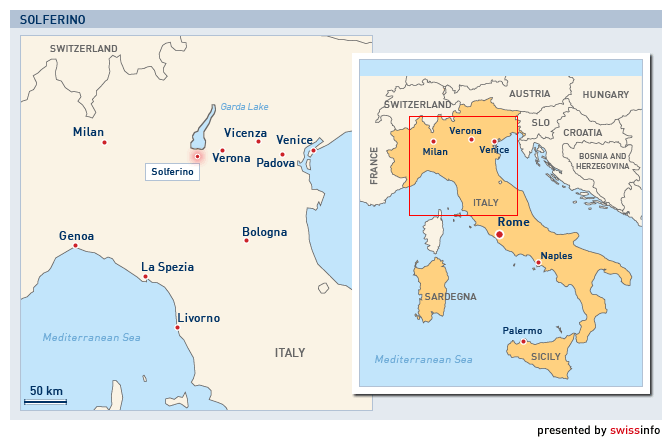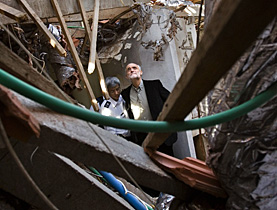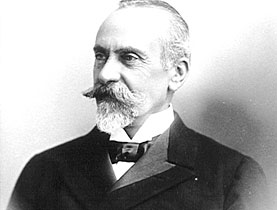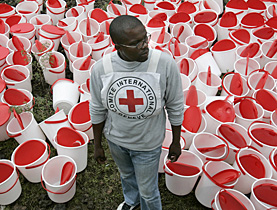Solferino: the bloody birth of a nation

On June 24, 1859 the armies of France and Piedmont-Sardinia defeated Austrian forces at Solferino in northern Italy in a decisive bloody battle for Italian unity.
“On June 25 the sun illuminated one of the most horrific sights imaginable,” wrote the young Swiss businessman Henri Dunant, who witnessed the suffering and death on the battlefield.
Dunant was deeply shocked by what he saw. On his return to Geneva he wrote a book about his experiences, entitled A Memory of Solferino, which would prove a landmark and provide inspiration for the founding of the Red Cross.
The book gives both an epic account of the battle and a testimony of the horrors of war, and still has an impact even 150 years later.
Dunant was at Solferino, near Lake Garda, by chance. But what was one of the fiercest battles of the 19th century left a huge impression on the young entrepreneur.
According to historians, at least 230,000 soldiers from the Franco-Sardinian and Austrian armies fought on the battlefield along a 15-kilometre frontline in a fierce conflict that lasted over 12 hours.
On the morning of June 24 the forces gathered on hills south of Lake Garda. Neither side expected to encounter such sizeable opponents. The clashes were chaotic and often involved hand-to-hand fighting.
Death toll
The casualties were staggering with thousands of soldiers dead on the battlefield.
“The official reports of the time talked about just under 5,000 dead,” said sociologist Costantino Cipolla, coordinator of a four-volume work on Solferino.
“But in 1870 the buried bodies were exhumed from the battlefield for hygiene reasons,” he continued. “That’s when they found at least 9,500 bodies. And that’s not including those who were buried in cemeteries or who died later from their injuries.”
The final casualty figure was much worse than the official reports: over 20,000 dead.
A revolutionary victory
Solferino was a decisive battle and the victory of the Franco-Sardinian forces over Austria opened the doors to independence and unity.
“Without Solferino [Italian military leader] Giuseppe Garibaldi’s expedition to Sicily and the unification of the country would have been unthinkable,” said Cipolla. “The battle was the highpoint for Italian unity. From then onwards there was no turning back.”
But the battle had other greater repercussions.
“Solferino marked the definitive victory of popular sovereignty over the monarchy. It’s no wonder that radical texts of the time talked about a victory of the revolution,” said the sociologist, who teaches at Bologna University.
Leaders “present”
Strangely, Solferino was also one of the last battles where the sovereign leaders of warring nations were present as commanders- in-chief: Napoleon III for France, François-Joseph I for Austria and Victor-Emmanuel II for Sardinia.
“Their presence was a kind of historical joke,” said Cipolla. “Victor-Emmanuel was smoking a cigar some four to five kilometres away from the battlefield. François-Joseph was also far away. Napoleon III was the only one within cannon range; so close that some of his assistants were injured.”
But thanks to Dunant Solferino proved to be another turning point.¨
“Since then, war has no longer been viewed simply as a glorified moment of victory. Thanks to Dunant it began to be seen from the victims’ perspective,” said the Italian professor.
Andrea Tognina, swissinfo.ch
(Translated from French by Simon Bradley)
In July 1858 Emperor Napoleon III and Camillo Benso, Count of Cavour, the prime minister of the Kingdom of Piedmont-Sardinia, signed a secret treaty of alliance against Austria.
France would help Sardinia to fight against Austria if attacked, and Sardinia would then give Nice and Savoy to France in return.
Cavour, being unable to get the French help unless the Austrians attacked first, provoked Vienna with a series of military manoeuvres close to the border.
Austria issued an ultimatum on April 23, 1859, asking for the complete de-militarization of the Kingdom of Sardinia. When it was not heeded Austria started a war with Sardinia, drawing France into the conflict.
On June 24, 1859 the Battle of Solferino resulted in the victory of the Franco-Sardinian alliance. At least 230,000 soldiers fought in the battle, the largest since the Battle of Leipzig in 1813.
Napoleon III eventually signed a peace accord with Austria on July 11, 1859.
In 1860 the central Italian states were annexed by the Kingdom of Sardinia, and France took its reward, Savoy and Nice.


In compliance with the JTI standards
More: SWI swissinfo.ch certified by the Journalism Trust Initiative














You can find an overview of ongoing debates with our journalists here . Please join us!
If you want to start a conversation about a topic raised in this article or want to report factual errors, email us at english@swissinfo.ch.